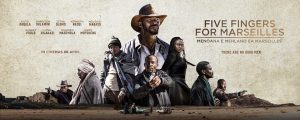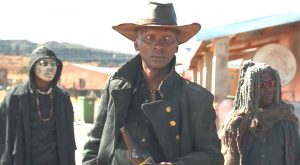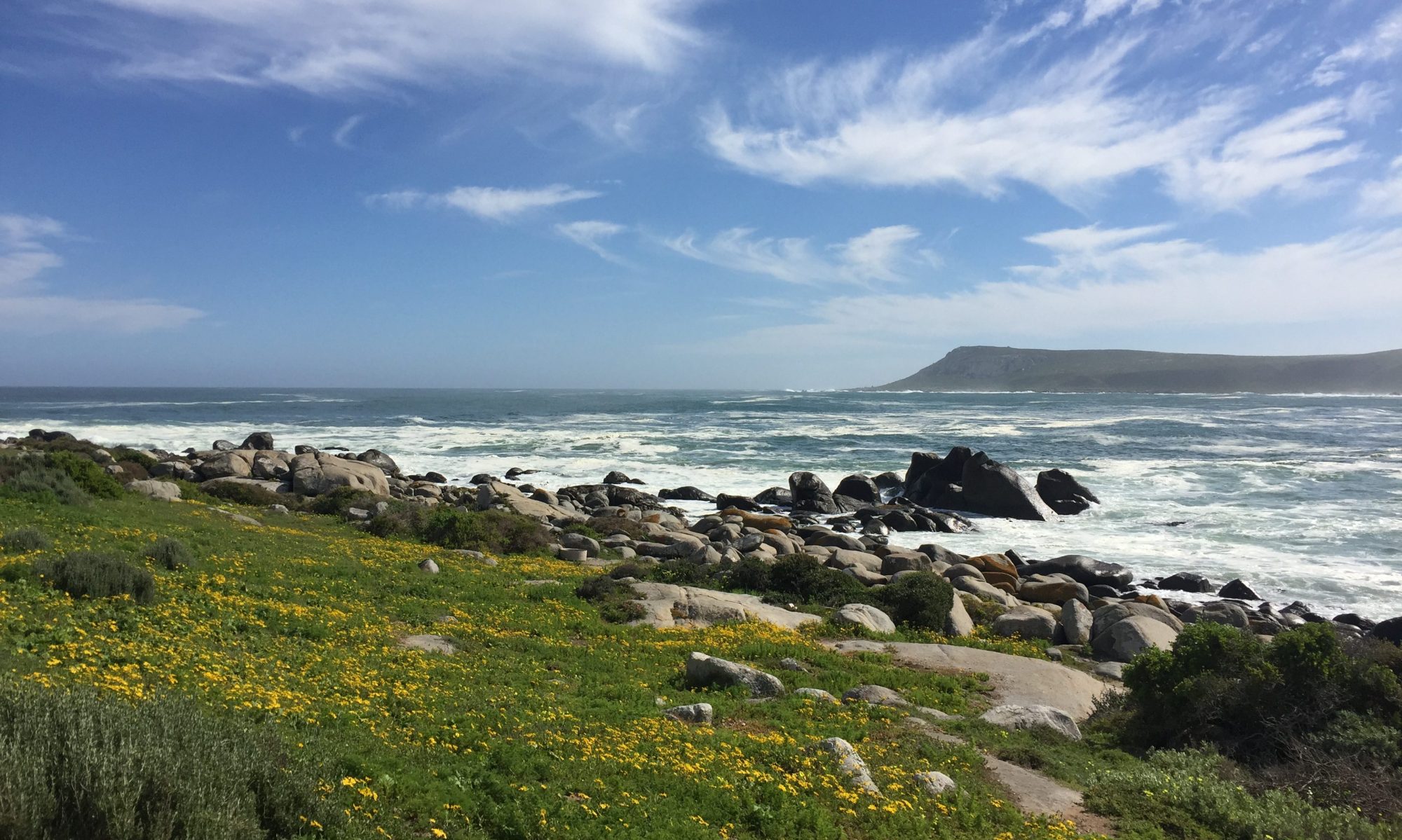Last weekend, for the first time in a few years, I found myself in New York City, a place I really love spending time. I got to hang out with friends both old and new, and see a particularly interesting performance of Hamlet in a wonderfully “only in New York” kind of venue: an empty room in an apartment with maybe fifteen folding chairs set up for the audience. On Saturday, though, I had the privilege of seeing a South African film I have been hoping to see for a long time: the gritty Western Five Fingers for Marseilles. I remember first seeing the trailer last August, and ever since then I wondered whether I would ever get the chance to see the complete film. With an all-star South African cast, an intriguing (if vague, going by the trailer) storyline, and the stunning backdrop of the Free State-Lesotho borderlands, I fell for this movie and its bizarre title (the Marseilles of the movie, it turns out, is a small Free State dorpie instead of a French seaport), uncertain of what it would actually be like.

Anyway, I had the opportunity to see it last weekend as part of the New York African Film Festival at the Lincoln Center’s cinema, even though the movie isn’t slated to have an actual American theatrical run until September. I saw it with some wonderful friends of mine living in New York City (not Africanists or historians) and a film buff friend of theirs, whom I had never met before. The film, we all agreed, has its flaws: it’s much more of an aesthetic exercise than a character-driven story (owing to the nature of the script rather than the excellent cast). Nevertheless, particularly for anyone interested in the dynamics of post-apartheid South Africa, it’s a beautiful and, I would say, provocative through its engagement with the Western genre. I’m very happy I saw it.
Directed by Michael Matthews and written by Sean Drummond (originally in English and translated by Mamokuena Makhema into Southern Sotho), the film centers around Tau (Vuyo Dabula, who also plays Gadaffi in the SABC1 soapie Generations: The Legacy) and his four childhood friends living in Railway, a tiny township on a hill overlooking Marseilles in the early 1980s. There, under the leadership of the charismatic Zulu, Tau and the other “Five Fingers” do battle with apartheid police and protect their homes. Armed with little more than bicycles and slingshots, Tau goes on the lam while still a child after a skirmish with the police turns deadly. Decades later, in the present, Tau finds himself out of prison and returns to Marseilles to see what has become of it post-apartheid. The picture is complicated: Railway is nearly emptied out, but Tau’s old friend Bongani (also known as Pockets, played by Kenneth Nkosi) has become mayor and is vigorously promoting the government’s new housing scheme in “New Marseilles,” down the hill. Another of the five fingers has become a pastor, another is the chief of police, while their leader Zulu is long-dead. What’s worse, the town is in the thrall of a mysterious gangster figure named Sepoko (“Ghost,” played by Hamilton Dhlamini), who, according to classic Western conventions, menaces the town with nihilistic violence and cruelty. To defeat Sepoko, Tau must assemble a new group of Five Fingers: Wei (Kenneth Fok), a Chinese shopkeeper whose family is being menaced by the police, Honest John (Dean Fourie), Railway’s white town drunk, Sizwe (Lizwi Vilakazi), Zulu’s son with his beloved Lerato (Zethu Dlomo), and two gangsters from Tau’s more recent past (Brendon Daniels and Anthony Oseyemi). With the aid of his ghoulish sidekick, the wonderfully vile Thuto (Warren Masemola), Sepoko ensures that the tale of Marseilles’s ambiguous redemption is soaked in as much blood as possible.

The film is violent. So violent, in fact, that one of my friends had to leave the screening midway through the film. Another one of my friends found the violence egregious and unjustified. This is, I think, a fair observation: the mood of the movie is brooding and bleak, the sparse dialogue in the film, which is almost entirely in Southern Sotho, is delivered with an impressive gravity by the veterans of stage and screen portraying Marseilles’s heroes and villains. Five Fingers takes itself very seriously, but its characters are little more than the familiar stock characters from famous Westerns of yore, South Africanized for their immediate setting. Sepoko, for example, is a wonderful villain in speech and gesture but not in motivation: why exactly is he so evil and what does he want? As one of my friends commented, the fact that the movie fails to answer this question is particularly frustrating. Short of dying, in fact, none of the characters leave the film changed in any fundamental way, and so I can certainly understand criticizing Five Fingers as a needless spectacle (or worse, as my film buff acquaintance suggested, a mere imitation of a well-established genre). Through gorgeous cinematography and able performances, Five Fingers succeeds in delivering the suspenseful Western romp South Africans might not have known they needed, but does it succeed in saying anything new?
I thought about this as my friends and I waited patiently through the post-show talkback session. Michael Matthews was unable to attend the screening, but three people associated with the film were there to chat, and, since they were all white men, elicited a number of fair questions about the underrepresentation of black people at all levels of southern African cinema and the difficulties of working on a film in a language the white director and lead writer do not speak. The three men did a good job of fielding these questions, but through it all I couldn’t help wishing I was watching the talkback before a South African audience, which would have hopefully navigated the discussion towards greater specificity.
Eventually I asked my own question about the film’s engagement with post-apartheid South Africa. The answer I received bolstered a certain line of thought that I was still developing as the audience emptied out of the building.
Now, if you’re reading this from South Africa, you may have already seen Five Fingers, but if you’re in the United States you may not have another chance until the fall. I want to be careful about spoilers (the ending, which I’m not crazy about, is nevertheless something of a twist).
For me, Five Fingers for Marseilles really does succeed in saying something beyond mere imitation. This is a film about violence and its poisonous legacy; if the violence in the film appears egregious and spectacular, that is only because violence in South Africa often appears egregious and spectacular, from government corruption to cash-in-transit heists to astonishing rates of domestic abuse. The film, following many other great Westerns before it, never lets us forget that violence is corrosive, whether in the name of good or evil. Even in fighting against an unjust regime in the 1980s, it suggests that the Five Fingers were unable to transcend the trauma they experienced as children, and therefore to a certain extent are condemned to revisit it on the town they love. The inscrutable Sepoko, (whose name, interestingly, is the Sotho-ized version of the Afrikaans for ghost, spook) can perhaps be read as the incarnate manifestation of this legacy of trauma and violence on the land, from the early trekboer incursions up to the present. His “invasion” of New Marseilles from the dying old township of Railway, the event that sets up the movie’s climactic final battle, might therefore evoke the sabotage of post-apartheid attempts to transcend the past by history’s poisonous legacy.

The stance Five Fingers seems to take is that the freedom fighters of the past must step aside to allow a younger generation to break such cycles of violence. The character of Zulu’s son Sizwe (which means “nation”, in case the message were not clear enough), fills the classic role of the overeager youngster eager to take on the mantle of this late father, whom he never knew. Known to be an excellent shot, I kept expecting him to swoop in at the last moment and save the day at the film’s climax. Yet when his big moment comes, he is the only armed character to go through the whole film without using violence. In fact, according to the movie, Sizwe is perhaps the only character in whose hands the future of Marseilles is safe.
Even as I continue to be fascinated by South African cinema, I’m still working my head around the complexity of films as sources. Not only is a film like this open to a wide range of critiques and interpretations, not only can they be seen as the work of a multitude of different people, films from South Africa made in the hope of export are also subject to several additional layers of manipulation and mediation. Surely the positive reception Five Fingers seems to be receiving counts for something, but it’s difficult to conceptualize exactly how authorial intent works for something that’s clearly subject to review from so many quarters (when I say things like “the film implies,” what do I mean beyond my own interpretation?). Surely it also matters that the chief writer and director of the film were both white men: does their reading of the conflicts and silences of post-apartheid South Africa ring true for others?
At the same time, in a country where Mandela-era narratives about the success of reconciliation and the democratic transition are increasingly subject to challenge, films like Five Fingers that confront the messiness of the anti-apartheid “heroic age” and its legacy are surely welcome. I applaud the perseverance of the filmmakers in striving to market something so unique and quintessentially South African internationally: it bodes well for the future of South African film. Ultimately, if you like Westerns and are fascinated by the chilly emptiness of the South African interior, you will probably have a fine time at Five Fingers for Marseilles. If, in addition, you are curious about the intricacies of twenty-first century South Africa, and want some food for thought, I think there’s a fair amount to chew on as well.
